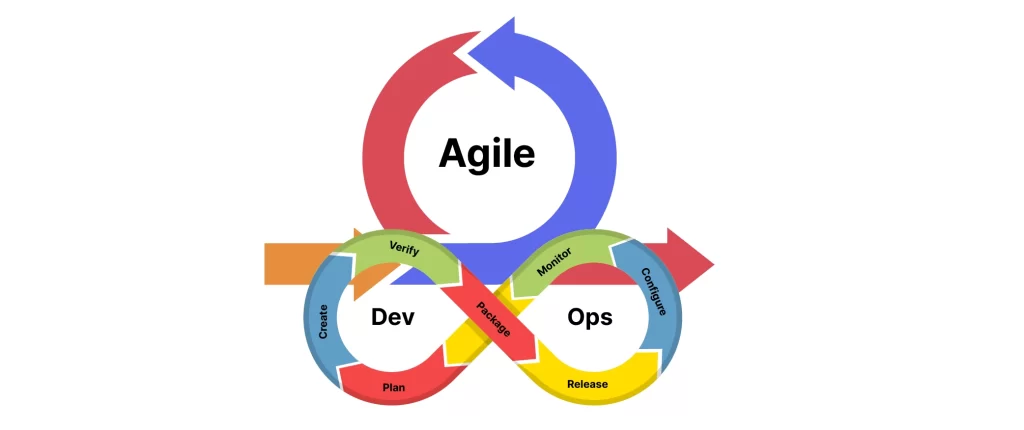“When teams operate independently, it creates communication gaps that can lead to disorder. In contrast, when teams collaborate, they tend to be more efficient.”
Agile and DevOps are two different approaches used in project management and software development, but they are often confused by organizations. Agile follows an iterative approach, breaking down work into smaller achievable targets, while DevOps focuses on unifying automated processes for better performance and delivery. There are a lot of misconceptions about the agile and DevOps approaches. One common misconception about these approaches is that they are interchangeable, when in fact they serve different purposes.
The article is written to address the common misconception about Agile and DevOps by explaining their fundamental differences in terms of scope, focus, and manifestation.
Let’s start by comparing both methodologies for a better understanding: DevOps vs Agile
DevOps | Agile |
|---|---|
Aims to improve efficiency by identifying processes that can be automated and developing new programs to support them. | Agile methodology prioritizes identifying pain points in the organization related to customer expectations and finding solutions to improve them. |
DevOps creates a common point for all processes in the organization, including quality control, development, and operations. | Agile puts the needs of employees before the organization’s needs and aims to make processes smoother for individuals in the organization. |
DevOps emphasizes the integration of development and operations teams through automation and continuous delivery. | Agile methodology prioritizes iterative development and adaptability. |
Agile and DevOps are often used interchangeably, leading to confusion and ineffective project management and software development. Understanding the differences between the two approaches can help organizations choose the most appropriate approach for their needs and achieve better outcomes.
Many organizations mistakenly believe that Agile and DevOps are interchangeable approaches that can be used interchangeably to manage projects and develop software.
Although, Agile and DevOps share some common principles and goals, such as collaboration, continuous improvement, and customer satisfaction. However, Agile is a project management approach that focuses on flexibility, adaptability, and customer satisfaction, while DevOps is a software development approach that focuses on automation, collaboration, and communication between development and operations teams.
The confusion between Agile and DevOps can lead to inefficient project management, delays in software development and deployment, and ultimately, dissatisfied customers.
Misconception number two is that simply investing in Agile and DevOps technologies will automatically improve an organization’s business operations.
However, the truth is that the company must undergo significant structural changes in policies, employee training, and communication to fully leverage the benefits of these methodologies.
Failing to make these changes can result in a waste of resources and an inability to achieve the desired improvements in software development and project management.
Misconception number three is the belief that DevOps technology can be used as a replacement for Agile methodology, but in reality, the two are co-dependent on each other. While both approaches share common goals, they are designed to address different aspects of the software development process.
Agile methodology focuses on project management and emphasizes flexibility, adaptability, and customer satisfaction, while DevOps focuses on software development and emphasizes automation, collaboration, and communication between development and operations teams.
Attempting to replace Agile methodology with DevOps technology can result in suboptimal project management, inefficient software development, and an inability to fully leverage the benefits of both approaches.
If you want to achieve the best results, you should integrate Agile and DevOps technologies to complement each other and achieve their desired goals.
By understanding the differences between Agile and DevOps, organizations can use the appropriate approach for their projects, resulting in better project management.
Using DevOps for software development can lead to faster delivery of high-quality software through automation, continuous integration and delivery, and collaboration between development and operations teams.
Understanding the differences between Agile and DevOps can enhance communication and collaboration between project teams and development and operations teams, leading to better outcomes for the organization and its customers.

Agile is a project management approach that emphasizes flexibility, adaptability, and customer satisfaction. It focuses on delivering working software iteratively and incrementally while responding to change and feedback. Agile is characterized by continuous collaboration and communication, frequent delivery of working software, self-organizing teams, and a focus on customer satisfaction.
DevOps, on the other hand, is a software development approach characterized by continuous integration and delivery, automated testing and deployment, infrastructure as code, and a culture of collaboration and communication between development and operations teams.
In conclusion, it is clear that Agile and DevOps are two distinct methodologies that organizations should not consider interchangeably. The misconceptions associated with these approaches can lead to inefficient project management and software development, ultimately impacting customer satisfaction. By understanding the differences between Agile and DevOps, organizations can implement the appropriate approach for their specific needs, leading to better project management, improved software development, and enhanced collaboration and communication between teams. It is essential to leverage the strengths of each approach to achieve the best outcomes for the organization. Therefore, it is crucial for organizations to invest in understanding the differences between Agile and DevOps to drive business success.
Follow IntellicoWorks for more insights!

Talk to us and let’s build something great together
A Subsidiary of Vaival Technologies, LLC
IntelliCoworks is a leading DevOps, SecOps and DataOps service provider and specializes in delivering tailored solutions using the latest technologies to serve various industries. Our DevOps engineers help companies with the endless process of securing both data and operations.
Ops
Cloud
AI & ML
Copyrights © 2023 byIntellicoworks. All rights reserved.